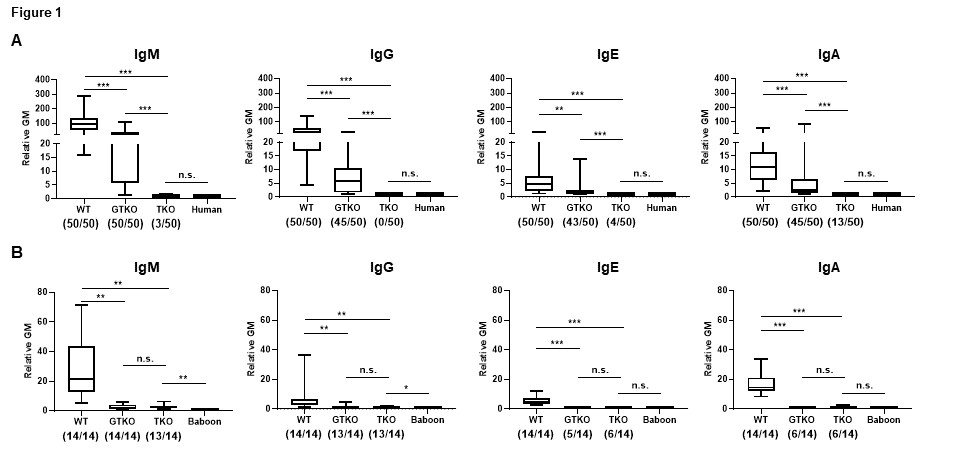Anti-pig IgE and IgA Antibodies in Sera of (i) Naïve Primates and (ii) Non-human Primates Sensitized to Pig Xenografts
University of Alabama at Birmingham, Birmingham, AL
Meeting: 2021 American Transplant Congress
Abstract number: 591
Keywords: Antibodies, Pig, Sensitization, Xenoreactive antibodies
Topic: Basic Science » Xenotransplantation
Session Information
Session Name: Xenotransplantation
Session Type: Poster Abstract
Session Date & Time: None. Available on demand.
Location: Virtual
*Purpose: Anti-pig IgM and IgG antibodies in primates play an important role in xenograft rejection. The possible roles of anti-pig IgE and IgA have not been investigated. Our aim was to measure (i) preformed serum anti-pig IgE and IgA in naïve humans and nonhuman primates (NHPs), (ii) elicited IgE and IgA after pig organ or tissue transplantation in NHPs, and (iii) their deposition in rejected pig xenografts.
*Methods: The binding of IgM, IgG, IgE and IgA antibodies to red blood cells (RBCs) from WT, GTKO, and TKO (i.e., not expressing Gal, Neu5Gc, or Sda xenoantigens) pigs was measured by flow cytometry in naïve humans (n=50) and baboons (n=14). Antibody binding to WT and GTKO pig (p) RBCs was also measured in the sera of baboons (non-sensitized: n=7, sensitized: n=2) and rhesus monkeys (non-sensitized: n=2, sensitized: n=11) following WT or GTKO pig organ/tissue xenotransplantation. Deposition of IgE/IgA in the grafts was detected by immunohistochemistry.
*Results: The majority of humans had natural preformed IgM/IgG/IgE/IgA to WT and GTKO pRBCs. In contrast, IgM/IgG/IgE/IgA to TKO pRBCs were present at lower levels and frequency (p<0.01) (Figure 1A). Baboons also had IgM/IgG/IgE/IgA antibodies against WT pRBCs, but less to GTKO and TKO (p<0.01) (Figure 1B). After xenotransplantation into NHPs, when IgM/IgG increased, IgE/IgA also increased, but to a lesser extent. In addition to IgM/IgG, IgE and/or IgA deposition was observed in rejected pig xenografts.
*Conclusions: Primates, especially humans, have natural IgE/IgA antibodies to GTKO pig cells, but little or none to TKO pig cells. After exposure to a pig graft, IgE and IgA antibody levels increase, but not to the same extent as IgM or IgG. Their exact role, if any, in xenograft rejection remains uncertain.
To cite this abstract in AMA style:
Hara H, Li Q, Iwase H, Yamamoto T, Ayares D, Cooper DK. Anti-pig IgE and IgA Antibodies in Sera of (i) Naïve Primates and (ii) Non-human Primates Sensitized to Pig Xenografts [abstract]. Am J Transplant. 2021; 21 (suppl 3). https://atcmeetingabstracts.com/abstract/anti-pig-ige-and-iga-antibodies-in-sera-of-i-naive-primates-and-ii-non-human-primates-sensitized-to-pig-xenografts/. Accessed July 12, 2025.« Back to 2021 American Transplant Congress

